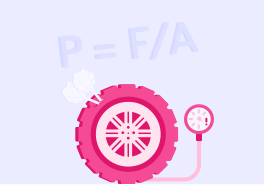YOU ARE LEARNING:
Volume and Pressure

Volume and Pressure
The exact pressure inside a container is dependent on a variety of factors. Let's explore what increasing or decreasing one of these factors, volume, will do to the pressure.
Which of these best describes the movement of gas particles held in a container?

What is the name of the force which is caused by particles of gas colliding with the walls of a container?

Which of the following factors could affect the pressure a gas exerts on the container? Select all the correct options from the list below.

You can select multiple answers
If you increase the amount of gas in a container what, will happen to the pressure exerted on the container by the gas?

Why does an increase in the amount of gas particles cause an increase in the pressure the gas exerts on the container?

If you increase the amount of gas particles you increase the amount of collisions occurring against the walls of the container. This then increases the pressure the gas exerts.
What would happen to the pressure exerted by a gas if you kept the volume of gas the same, but put it into a larger container?

Why does an increase in the size of the container cause a decrease in the pressure exerted by the gas?

If you keep the same amount of gas, but change the size of the container a gas is held in, it will affect the pressure the gas exerts. An increase in the container size will decrease the pressure due to fewer collisions. **** A decrease in container size will increase pressure as there will be more collisions.
Which of these would best describe the change in pressure if you **** significantly increased the volume of gas and reduced the volume of the container.

